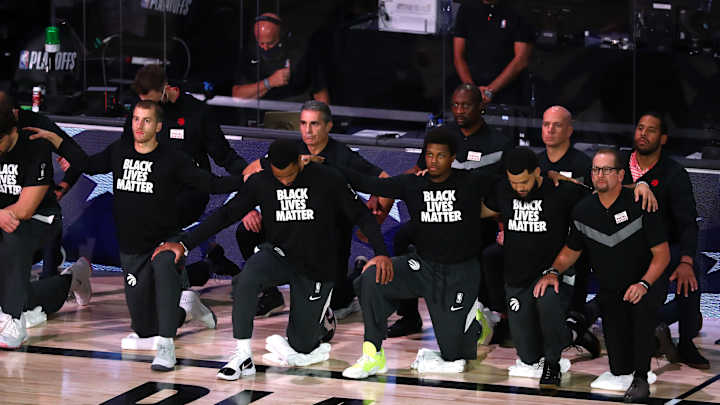Ujiri & Raptors Leaders For Social Change

August 23 was supposed to be a night of celebration for the Toronto Raptors. They were coming off a 150-122 blowout of the Brooklyn Nets to clinch their first playoff sweep in franchise history. They were 11-1 in the NBA Bubble, the best record in the league, and cruising into a second round playoff matchup against the Boston Celtics.
Then reality struck. Again.
Over 1,500 kilometers away from the peaceful Orlando Bubble, police in Kenosha, Wis. had just shot Jacob Blake in the back seven times.
Raptors players could hardly find the words to describe their pain.
"I was pretty excited," Fred VanVleet said on August 25 as his team prepared to take on the Celtics. "Then we all had to watch Jacob Blake get shot yesterday so that kinda changes the tone of things and puts things in perspective. That’s really kinda all that’s been on my mind."
It was on that Tuesday the 25th, a day before the Milwaukee Bucks decided not to come out of their locker room before their Game 5 against the Orlando Magic, that the idea of a strike first became public.
"You could just tell that everybody was feeling this certain way," Raptors president Masai Ujiri said reflecting on the days leading up to the NBA strike. "We had this meeting and everything had mounted on with Jacob Blake and the shooting, the video, like everything was coming this.
"Nobody was feeling good, nobody was feeling right."
That night the Raptors had another meeting and discussed the idea of a strike with Celtics players. Had the Bucks not protested their Game 5 on that Wednesday, the Raptors and Celtics likely would have shut down the league the following day.
"We were planning to do this because it had just become so mentally tough for us and we needed to have a pause in some kind of way," Ujiri said.
For Ujiri, police brutality is particularly personal. The shooting of Blake came just days after video was released vindicating Ujiri in his ongoing legal battle with an officer in Oakland who accused Ujiri of assaulting him after the Raptors clinched the NBA championship in 2019. For over a year, Ujiri knew what had happened at Game 6 in Oakland. He knew he didn't instigate the altercation, that it was officer Alan Strickland who shoved him, but without video evidence, people — including commissioner Adam Silver who said Ujiri needed to "learn to avoid" confrontational situations — questioned him.
"This was very hard for me," Ujiri said. "When this video came out I didn’t sleep for a few days because when these things happen, we saw the rush, we saw what everybody was writing, I mean, you look at these things and you can’t help but question yourself."
He said he began to doubt himself. He remembered watching videos of other instances of police brutality and thinking why didn't they just come forward and say what happened to them.
"I started to think what if this had gone the total wrong way," he said. "Then it starts to mess with your mind."
The difference between Ujiri and so many others is his privilege and financial support. He was able to fight back through the legal system.
"At the end of the day, I’m able to face this square on and I just started to think about the people that cannot do this," he said. "They cannot do what I can do, there are times and things that happen where there are no cameras, there are no people that can see, there will be no video, how do these people get incarcerated? How do these people get wrongfully accused?"
Those questions began nagging at Ujiri. He wondered if Black Lives Matter was just a saying, something that just Black people alone liked to say that would never actually lead to meaning full change.
"You ask yourself all those questions and it bothered me," he said. "I really struggled with this."
That's why the stand the NBA players made was so important to him.
"I think it made an impact," he said. "To have that platform of performing and then having to speak your mind and the reach, the effect that you have on people, I think it’s huge. It’s really, really big."
All along the Raptors have been leaders in the fight for social change. They arrived in Orlando with the words Black Lives Matter printed across their bus. They spoke out over and over again, calling for change and urging people to vote.
Even now with their playoffs over, they're still using their platforms to demand change.
"We have to fight this fight," Ujiri said. "We have to continue this fight. And it comes from—it starts with voting. It starts with voting. We cannot be afraid. A lot of leaders are afraid to speak. A lot of leaders are afraid to speak their mind. We all know what the issue is. The issue is leadership, OK? The issue is leadership. We all need to go out, vote and make the change that should happen, and we go from there."
Until change is made, the Raptors are going to continue being leaders.
